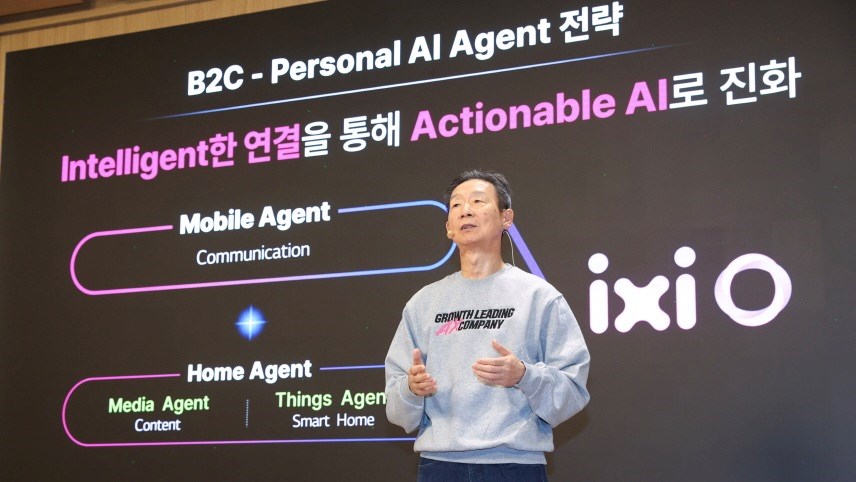
LG Uplus CEO Hwang Hyeon-sik introduces the ixi-O AI agent.
- LG Uplus is set to spend billions of dollars on becoming an AI-focused company, just like its South Korean telco peers
- The operator had previously communicated its plans to develop AI-enabled services for the enterprise sector
- Now it has revealed its consumer AI strategy and unveiled an on-device AI call agent
- A ‘my call agent is smarter than your call agent’ battle may be about to break out among South Korea’s mobile operators – will having the ’best’ AI agent help with market share gains?
LG Uplus, South Korea’s third-largest mobile operator, plans to invest up to 3tn won ($2.1bn) and forge close relationships with big tech giants, such as Google, over the next four years to help it become an AI transformation (AX) company, the telco’s CEO Hwang Hyeon-sik stated during an AI strategy presentation on 7 November.
In July this year, the operator shared its ambitious AI-fuelled ‘All in AI’ enterprise services strategy that the company hopes will drive 2tn won ($1.4bn) in annual revenues by 2028 – see LG Uplus goes all in on AI for the enterprise sector.
Now it has revealed how it plans to offer enhanced AI-enabled services to the consumer sector, with the CEO explaining that the South Korean operator is adopting a very customer-centric approach to its service development strategy.
“Customers don’t want AI technology itself, but an AX service that can be used in daily life… making a service that provides direct value to customers is the way LG U+ approaches AI,” stated Hwang.
“This year, we have been working hard for innovation based on generative AI by focusing all the company’s capabilities and we are releasing the results one by one. The more you focus on AX, the more you realise that the customer, not the technology,” is what is most important, ” added the CEO. “In order to grow into an AX company, customer-centred thinking [focused on] what customers want should be the most important priority.
“In order to satisfy all the detailed needs of customers, we need to cooperate with competent partners, but it is essential to strengthen our own capabilities to realise that cooperation,” continued the CEO, who namechecked Google as the kind of company he wants to work with closely, according to the Korea Economic Daily.
Some of that planned investment will go towards the further development of an AI call agent called ixi-O, which Hwang unveiled during his presentation.
The CEO noted that ixi-O is an ‘on-device’ agent that doesn’t rely on remote servers to keep it up to speed with essential information and processing. The company claims it can, therefore, instantly, reliably and securely tackle voice recording and conversational summaries and has a heightened ability to detect so-called phishing attempts without recourse to server-stored information, such as lists of suspect telephone numbers. Instead, it can intelligently assess the likelihood that an incoming call is a scam by analysing the call itself – the language used by the caller, intonation and so on – and advising the subscriber to hang up.
LG Uplus, which is part of South Korea’s fourth-largest conglomerate, isn’t alone in developing such AI applications. Its larger mobile operator rivals SK Telecom (SKT) and KT Corp. have also earmarked billions of dollars to fuel their own AI strategies.
SKT has been evolving its comprehensive ‘AI Pyramid Strategy’ over the past two years to transition itself to a global AI company, with investments in AI datacentres, multi-large language models, AI semiconductors and expansion into new business areas – see SKT unveils AI infrastructure superhighway plan.
It already has its own personal AI assistant called A. for its domestic market but also has its eyes overseas: SKT this week unveiled Aster(A*), an “AI-driven personal assistant tailored for global users” – it is due to be launched as a restricted beta service in North America later this year, with a full market launch planned for the following year.
Back in June 2023, Korea Telecom (KT) announced that it intended to spend $5.4bn on AI service developments by 2027.
While KT is putting money into cloud platforms, datacentres and AI chips, it is focusing on services rather than hardware and is positioning itself as an ‘AI Robot Service Provider’. It also has a popular AI voice assistant called GiGA Genie, which can control TVs, offer real-time traffic updates, and perform various home-assistance tasks using voice commands.
As a result, South Korea looks like being an interesting AI assistant battleground as LG Plus enters with ixi-O, currently available on the Apple iPhone with support for Android to follow in early 2025. The operator plans to expand the underlying ixi-GEN large language model with industry-specific versions for other sectors, such as finance, education, and security, along with 'ixi-Solution' for enterprise customers.
South Korea looks like a fascinating telco AI battleground where having the best AI agent might well be a key factor in attracting customers in what is already a saturated market.
– Ian Scales, Contributing Editor, TelecomTV
Email Newsletters
Sign up to receive TelecomTV's top news and videos, plus exclusive subscriber-only content direct to your inbox.




